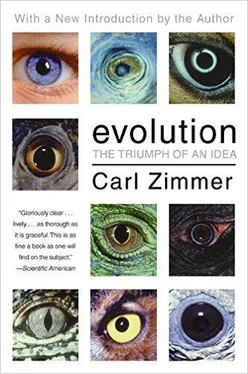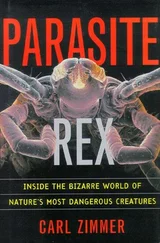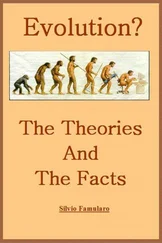When Darwin arrived in Anne’s room in Malvern, he collapsed on a couch. The sight of his ill daughter was awful enough, but the camphor and ammonia in the air reminded him of his nightmarish medical school days in Edinburgh, when he had seen children operated on without anesthesia. For a week—Easter week, no less—he watched her fail, vomiting green fluids. He wrote agonizing letters to Emma. “Sometimes Dr. G. exclaims she will get through the struggle; then, I see, he doubts—Oh my own it is very bitter indeed.”
Anne died on April 23, 1851. “God bless her,” Charles wrote to Emma. “We must be more & more to each other my dear wife.”
When his father had died, Darwin had felt a numb absence. Now, when he came back to Down House, he mourned in a different way: with a bitter, rageful, Job-like grief. “We have lost the joy of our household, and the solace of our old age,” he wrote. He called Anne a “little angel,” but the word gave him no comfort. He could no longer believe that Anne’s soul was in heaven, that her soul had survived her unjustifiable death.
It was then, 13 years after Darwin discovered natural selection, that he gave up Christianity. Many years later, when he put together an autobiographical essay for his grandchildren, he wrote, “I think generally (and more and more as I grow older), but not always, that an agnostic would be the most correct description of my state of mind.”
Darwin did not trumpet his agnosticism. Only by poring over his private autobiography and his letters have scholars been able to piece together the nature of his faith after Anne’s death. Darwin wrote a letter of endorsement, for example, to an American magazine called The Index, which championed what it called “free religion,” a humanistic spirituality in which the magazine claimed “lies the only hope of the spiritual perfection of the individual and the spiritual unity of the race.”
Yet when The Index asked Darwin to write a paper for them, he declined. “I do not feel that I have thought deeply enough [about religion] to justify any publicity,” he wrote to them. He knew that he was no longer a traditional Christian, but he had not sorted out his spiritual views. In an 1860 letter to Asa Gray, he wrote, “I am inclined to look at everything as resulting from designed laws, with the details, whether good or bad, left to the working out of what we may call chance. Not that this notion at all satisfies me. I feel most deeply that the whole subject is too profound for human intellect. A dog might as well speculate on the mind of Newton.”
While Haeckel and others tried to use evolution to overturn conventional religion, Darwin stayed quiet. In private he complained about the way social Darwinism twisted his own work. Once, in a letter to Lyell, he wrote sarcastically, “I have received in a Manchester newspaper rather a good squib, showing that I have proved ‘might is right’ and therefore that Napoleon is right, and every cheating tradesman is also right.” But Darwin decided not to write his own spiritual manifesto. He was too private a man for that.
Despite his silence, Darwin was often pestered in his later years for his thoughts on religion. “Half the fools throughout Europe write to ask me the stupidest questions,” he groused. The inquiring letters reached deep into his most private anguish.
To strangers, his responses were much briefer than the one he had sent to Gray. To one correspondent, he simply said that when he had written Origin of Species, his own beliefs were as strong as a prelate’s. To another, he wrote that a person could undoubtedly be “an ardent theist and an evolutionist,” and pointed to Asa Gray as an example.
Yet to the end of his life, Darwin never published anything about religion. Other scientists might declare that evolution and Christianity were perfectly in harmony, and others such as Huxley might taunt bishops with agnosticism, but Darwin would not be drawn out. What he actually believed or didn’t, he said, was of “no consequence to any one but myself.”
Darwin and Emma rarely spoke about his faith after Anne’s death, but he came to rely on her more with every passing year, both to nurse him through his illnesses and to keep his spirits up. At age 71, he looked over the letter she had written to him just after they married, urging him to remember what Jesus had done for him. On the bottom he wrote, “When I am dead, know that many times, I have kissed & cryed over this.”
Two years later Emma caught him in her arms when he collapsed at Down House. For the next six weeks she cared for him as he cried out to God and coughed up blood and slipped into unconsciousness. On April 19,1882, he was dead.
Emma planned to have her husband buried in the local churchyard, but Huxley and other scientists thought the nation should honor him instead. When Darwin had started as a scientist, the word scientist did not even exist yet. Natural history was butterfly collecting in the service of piety. Fifty years later scientists were society’s leaders, looking deeper every year into the workings of life itself. Westminster Abbey was not only for kings and clergy—the explorer David Livingstone was buried there, as was James Watt, the inventor of the steam engine. Colonies and industry had made England great, and so too, it was agreed, had Darwin.
A few days later Westminster Abbey filled with mourners, and Darwin’s coffin was brought to the center of the transept. A choir sang a hymn adapted from the Book of Proverbs.
Happy is the man that findeth wisdom, and the man that getteth understanding.
She is more precious than rubies: and all the things thou canst desire are not to be compared unto her.
Length of days is in her right hand; and in her left hand riches and honour.
Her ways are ways of pleasantness, and all her paths are peace.
Darwin was lowered into the floor of the abbey, close to Newton. Now he would be silent forever about his faith. He had left us behind, in the natural world he had unveiled. It is an ancient world, in which we are an infant species; a braided river of genes flows around us and through us, its course altered by asteroids and glaciers, by rising mountains and spreading seas. When Darwin wrote Origin of Species, he promised his readers “a grandeur in this view of life,” and life now displays far more grandeur than even Darwin appreciated. He began the exploration of this remarkable world, and he left us to walk deeper into it, without him.
CHAPTER 1: DARWIN AND THE BEAGLE
Appel TA. Cuvier-Geoffroy debate: French biology in the decades before Darwin. New York: Oxford University Press, 1987.
Browne EJ. Charles Darwin: A biography. New York: Knopf, 1995.
Coleman WR. Georges Cuvier, zoologist: A study in the history of evolution theory. Cambridge, Mass.: Harvard University Press, 1964.
Darwin C. Journal of researches into the natural history and geology of the countries visited during the voyage of H.M.S. ‘Beagle’ round the world, under the command of Capt. Fitz Roy, R.N. London: Henry Colborn, 1839.
Desmond AI, Moore JR. Darwin. London: Michael Joseph, 1991.
Koerner L. Linnaeus: Nature and nation. Cambridge, Mass.: Harvard University Press, 1999.
Lovejoy AO. The great chain of being: A study of the history of an idea.
Cambridge, Mass.: Harvard University Press, 1936.
Lyell C. Principles of geology; or, The modern changes of the earth and its inhabitants, considered as illustrative of geology. London: John Murray, 1850.
Mayr E. The growth of biological thought: Diversity, evolution, and inheritance. Cambridge, Mass.: Belknap Press, 1982.
Читать дальше












